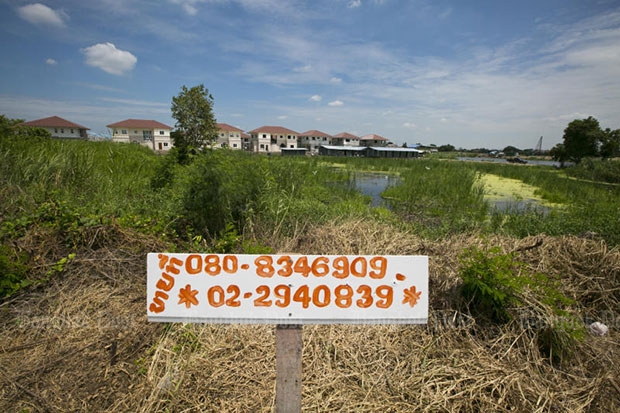JLL upbeat on new property tax
- Published: 24 Jun 2016 at 06:00 0 comments
- NEWSPAPER SECTION: Business

The impact of the new land and buildings tax should be more positive than negative, says property consultancy firm JLL.
Suphin Mechuchep, managing director of JLL, said the new tax policy should promote more efficient land and real estate use, benefiting the country's property industry in the long run.
"The land and buildings tax will increase risk exposure for speculators who acquire property with the hope of holding it until it becomes more valuable and then reselling it for a profit. With the new tax, holding property could be costly, particularly when the property is left unutilised or does not generate any income," said Mrs Suphin.
She said the new tax would help reinforce the trend of professional developers focusing mainly on land plots for immediate development rather than buying land without a concrete plan for what they will actually do with it.
"If well-executed, the land and buildings tax should yield immense long-term benefits for the country," she said.
The cabinet approved the long-awaited land and buildings tax earlier this month, which is designed to expand the national taxpayer base.
The bill, which takes effect next year, sets ceiling rates of 0.2% of appraisal value for land used for agricultural purposes, 0.5% for residences, 2% for commercial use and 5% for vacant or undeveloped land.
The tax will be levied on primary homes and land used for agricultural purposes with appraisal prices starting at 50 million baht. The rate will be applied to the amount exceeding 50 million baht.
Owners of primary homes and farms with an appraisal price below 50 million baht will be exempt from the tax.
The tax will also apply to second homes on a progressive basis, with rates of 0.03% to 0.30% for homes whose appraisal values range anywhere from under 5 million baht to over 100 million.
For vacant or undeveloped land, the tax rate will be imposed at 1% for 1-3 years, 2% for 4-6 years and 3% for more than seven years.
Mrs Suphin said it would take some time for property owners to familiarise themselves with the new tax, resulting in short-term negative effects being felt by many.
"As the new tax will introduce financial burdens on owners of properties that do not meet the tax exemption criteria, some of these owners will be forced to make better use of their property to avoid a high tax rate and/or get the property to generate income to offset the holding cost. Others will be pressured to dispose of their property surplus so as to escape from this tax burden," she said.
Mrs Suphin said many of these owners are "asset-rich but cash-poor", and may not be able to afford the new tax, especially when their assets are high-value. This may lead them to dispose of their real estate assets.
Banks are another group of owners that could face pressure from the new tax policy and may have to accelerate the disposal of foreclosed real estate collateral.
"Though a low land and buildings tax rate of 0.05% is planned for banks' non-performing assets [NPAs] for a period of five years, the tax on foreclosed high-value real estate collateral could still be significant. Banks are expected to emphasise disposing of these NPAs," said Mrs Suphin.
Property owners looking to sell may be flexible on the price to speed up sales, she said.
But owners with capital are unlikely to lower their asking price, tagging on the increased costs to the selling price. "This strategy may work when the asset is a sought-after property in a prime location," said Mrs Suphin.
For income-generating properties, there remains no clarity around whether the existing 'rental' tax (12.5% of the annual rental value or the annual assessed rental value) will remain or be replaced by the new tax.
"Landlords will undoubtedly pass on additional costs from the new tax to tenants, pushing up gross rents by varying amounts in all sectors," she said. "Owners of rental apartments in Bangkok may absorb most of the additional tax cost themselves because of fierce competition for tenants, including from condos. But in the Bangkok office sector, which is a sellers' market, most of the additional cost will be passed on to tenants either directly or indirectly."



0 people commented about the above
Readers are urged not to submit comments that may cause legal dispute including slanderous, vulgar or violent language, incorrectly spelt names, discuss moderation action, quotes with no source or anything deemed critical of the monarchy. More information in our terms of use.
Please use our forum for more candid, lengthy, conversational and open discussion between one another.
Click here to view more comments